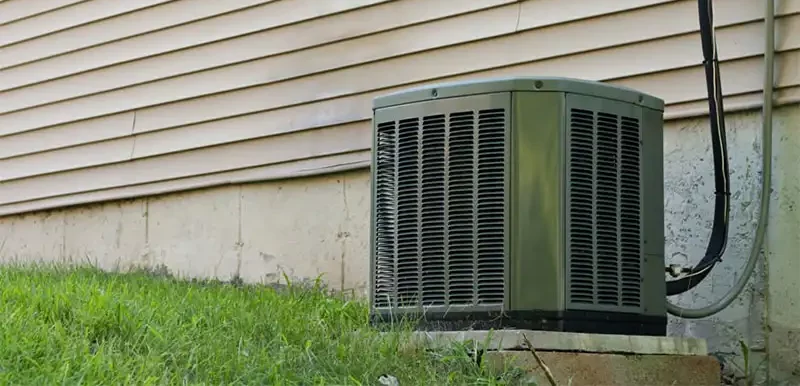November 15, 2022
How Does A Heat Pump Work In Winter?

When it comes to heating your home for the winter, you want to do it as efficiently as possible while being cost-effective. While some people use a gas furnace as their heating system, there are other options to keep your home warm this winter. Have you ever thought of using a heat pump?
A heat pump can work in cold weather to heat your home and save you money. Many people are unaware of how energy efficient a heat pump can be. We’re going to explain how a heat pump works in the winter, the benefits, as well as maintenance tips, and why you may want to consider it as a heating option to lower your energy bills.
How Does A Heat Pump Work?
Heat pumps work by moving heat energy. They take heat from outside your home and transfer it inside. Since moving heat takes less fuel than producing heat, a heat pump is extremely efficient and is much more energy efficient than a standard heating system.
Heat Pumps Vs. Traditional Heating Systems
When you’re looking at how efficient an air-source heat pump is, you need to look at the heating seasonal performance factor (HSPF). This is a rating that divides the total heating output during the heating season by the amount of energy that is consumed during that time. The higher the number is, the more energy efficient the system is.
A heat pump with a high HSPF can handle extremely cold temperatures. Many models are 100% efficient even at sub-freezing temperatures. Since they consume less electricity in moderate weather, air-source heat pumps cost less than other heating systems. This is why many people in moderate climates look at heat pump technology as a heating source in the winter.
Forced-air systems like natural gas furnaces have to generate heat instead of moving it to one place or another. This takes more energy to stay warm. This is why a natural gas furnace will cost more to work in the winter than a heat pump.

How do Heat Pumps Take Heat from Outside Air?
Heat pumps take air from outside your home and pump it inside by using refrigerant-filled coils, similar to what you’ll find behind your fridge. There are two fans, the coils, a reversing valve, and a compressor that make the pumps work in cold weather.
Geothermal heat pumps are another type of mechanical heating and cooling system that uses the earth’s natural heat to warm outside air in winter and cool it in summer. In winter, the system extracts heat from the ground and transfers it to the air inside your home. In summer, the process is reversed, and the system cools your home by extracting heat from the air inside and transferring it to the ground. The result is a comfortable indoor environment all year round, with minimal impact on the environment. Geothermal heat pumps are an efficient and sustainable way to heat and cool your home, and they can save you money on your energy bills.
How Do Heat Pumps Work In Cold Weather?
An air source heat pump follows the same process in winter as it does in summer, just in reverse. During winter it extracts available heat from the outdoor air and brings it into your home. It’s able to do this because it has a closed-loop system that allows it to work both ways.
A low-pressure liquid refrigerant passes through the outdoor condenser coils. This is where it will absorb ambient heat from the outside. The heat then makes the refrigerant boil and convert into low-pressure vapor. The vaporized refrigerant is pushed to the compression. This is where it gets pressured to help you stay warm.
This warm, pressurized refrigerant now moves to the indoor unit where it heats up the air that is blown over the exchanger. As the refrigerant loses heat, it turns back into a liquid and is transported out to start another cycle.
Why new heat pumps are much better than old ones
New heat pumps are better than old ones because there have been major upgrades to the individual components. These have made a big difference in how a heat pump works in the winter.
Improvements in new heat pumps include:
- Redesigned compressors
- Better motors
- More efficient fans
- Improved coil designs
At Bowman Mechanical Services, we can help you find the right heat pump to have you stay warm and save money on energy bills.
Are Heat Pumps A Good Fit For North Carolina Homes?
Heat pumps are a good fit for North Carolina homes because the climate is moderate. As the heat pump moves air around, it helps to keep your house warm in a cost-effective way.
It also helps to keep your home cool in the summer versus running an air conditioner 24/7.
Benefits of a Heat Pump
If you’re thinking of adding a heat pump to your home, there are many benefits to consider. The benefits of air-source heat pumps include:
Energy Efficiency
Since heat pumps move air from one place to another they are more energy efficient than other heating systems that need to make heat from scratch. This means you’ll save money on energy costs.
Safety
Heat pumps are safe to operate and require little maintenance compared to other heating systems.
Durability
Heat pumps tend to last longer than other heating systems. Many have a lifespan of 15 years when they are taken care of.
Humidity Control
Heat pumps help to control humidity because they don’t take moisture out of the air like furnaces can in the winter.
Dual Functionality
A heat pump offers heating and cooling in one unit. Instead of relying on both a furnace and an air conditioner, a heat pump offers both heating and cooling in one unit.
Cost
One of the main benefits of a heat pump is that it is very cost-effective. The initial cost of the unit is often comparable to that of a traditional furnace or air conditioner. However, operating costs are much lower, since heat pumps do not use fossil fuels such as natural gas or oil. In addition, heat pumps are very efficient, meaning that homeowners will see significant savings on their energy bills.
Heat Pump Maintenance Tips
To keep your heat pump working at its best, you need to keep up with maintenance. This includes:
- Replacing air filters every 30-60 days
- Scheduling professional HVAC maintenance twice a year
- Check your outdoor unit regularly and clear away any debris from the unit
- Make sure the heat pump is completely level and supported by a concrete support pad
By being proactive, you can help to keep your heat pump working properly and stay warm all winter long.
Contact Bowman Mechanical For Your Heat Pump Installation And Repairs
If you’re interested in installing a heat pump, call Bowman Mechanical Services. We are Raleigh’s most trusted HVAC company and have the necessary experience to install a heat pump at your home. We can also answer your heat pump questions.
Besides installation, Bowman Mechanical Services is also your source for heat pump repairs. Our team is here to make sure your home has enough heat to stay warm this winter. Count on us when you want a comfortable temperature throughout your home. Call us today at [phone] or reach out to us online to learn more about our services.

